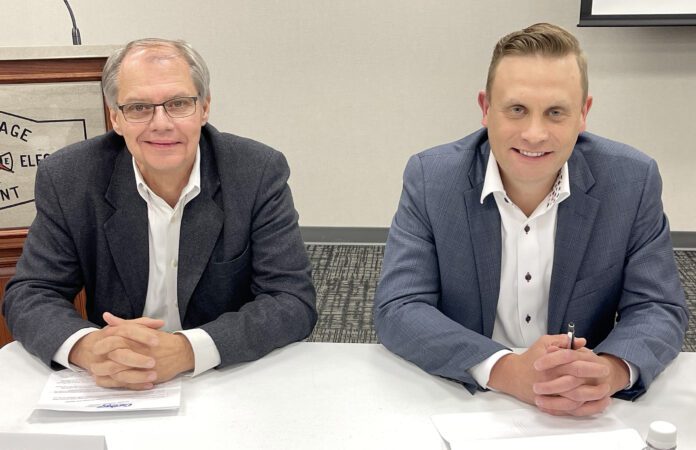
Two candidates will appear on the ballot for the two-year term as representing Ward 5 on the Carthage City Council in the April 5, 2022 election, Mark Elliff and Shawn McGrew.
The two answered questions at a candidate forum hosted by the Carthage Chamber of Commerce on Tuesday, March 29, 2022.
Here are their two-minute answers in the order they answered the questions at the forum:
Briefly tell us about yourself?
- Shawn McGrew
I’ve grown up here in Carthage, graduated here, married my wife and have two wonderful daughters who are currently attending school here. I’m very involved in their activities and things going on in their life through school. I was able to graduate from Missouri Southern State University and then went on to Missouri State where I received my graduate degree in organizational communication. My first job was here teaching school at the You Turn that was here in town, some very meaningful work, loved that opportunity. I then had the chance to work in health care, I went to Columbia and worked at the University of Missouri Health Care for a few years. I returned here and worked for Freeman Health System but now I’ve had the opportunity to work with large health systems across these United States focused on strategic planning, really identifying ways they can more effectively communicate with patients, with their care givers. I really want to put these tools and the knowledge I’ve developed over the years through my career, personal experience, boards that I’ve been able to serve on, to benefit members of our community to ensure we continue the great and rich history we have here in Carthage for future generations.
- Mark Elliff
I recently retired after 34 years of banking and after that 10 years as president and CEO of the Carthage Chamber of Commerce. My wife and I, Vickie, have lived in this area all our lives pretty much. Most of my time has been spent here except for about five years when I was in Booneville, I was not in correctional center, I was running a bank at the time. I’ve worked in all the different parts of banking going from teller to CEO. The last 10 years working at the Chamber has given me a different viewpoint being involved in the city. As far as I can remember I’ve been serving, working on different boards, non-profits, in addition to the jobs I’ve done here in Carthage. The main reason I’m running is I want to continue the service to the Carthage community. I love this community, I think we’ve got a lot of good things going on and I think we’ve got some great opportunities.
What makes you the best candidate to be elected to the office you seek?
- Mark Elliff
My background was in banking, about 34 years. During that time I worked with a lot of industries, a lot of businesses, a lot of individuals. You may think that’s just loaning money but it’s interesting, sometimes you also become a counselor and you hear a lot of things from different people and you learn about them, you learn about the community. With that background, when I changed and was with the Chamber, eight years of those 10 years with the Chamber I was the economic development director for the city of Carthage. During that time I worked with the city, worked with businesses, worked with industries on how to improve the quality. That included homes and housing which is definitely an issue that’s needed in our community. Coming up with ways we can expand and be able to offer things like that. I would say I’m a big picture person. I like to look at the whole picture but then details and drill down when you need to look at the smaller things. It’s important to see how everything works together. Sales tax is basically what is needed for the city to operate. That is generated by having businesses, you have businesses you need employees, employees needed places to live. It all is tied together and it’s important how we can work and do that together. Eight years I was economic development director I worked closely with the city, worked closely with city council, I understand how ordinances and resolutions work and what is needed so starting on day one I’ll be able to go ahead and move into that.
- Shawn McGrew
Working in health care has been the biggest part of my professional experience and in doing that it’s with multi-billion dollar organizations with 100,000-plus employees and what I’ve seen time and time again whether we’re looking at an issue related to a service line or different components that are going on, so much of that boils down to effective communication. I think some of the things we see, some of the challenges we have, are we effectively communicating with citizens across Carthage to understand what are some of the most challenging issues. What are there reasons decisions are being made and I think there’s a real opportunity for us to look at how do we more fully engage the community around the direction where we’re going, of understanding why things are going to be important. I think there are going to be topics that come up tonight whether it’s about Baker Street or about some of the bridges on North Garrison, and it’s going to be so important when we’re talking about those things that we’re listening to the feedback from the community, that we’re reinforcing why things are taking place, so for me, a core piece that I bring is the ideas around how do we develop that more effectively. I think also strategic planning, when we think about the future, when we think about growth, when we think about development, so much of the work that’s done on this council has to do with a real strategy and how are we aligning behind that to look long-term. There’s constantly near-term issues that are coming up. Right now we’re dealing with housing, it’s a significant issue. We have a 90-percent occupancy rate, a lot of those are renters, we don’t have a lot of property available for additional individuals to move in. How are we strategizing to fix these and that’s what I want to bring to this is more effective communication, more effective strategy and engagement from the community.
A serious topic that is being discussed in the city is the replacement of the three North Garrison Street bridges. The projected price tag is $30 million to replace these bridges. Is this a priority for the city and how should it be funded?
- Shawn McGrew
It absolutely is a priority. To me the bigger priority with it is safety. Something has to be done with them, the $30 million price tag is significant but what’s even more significant is the potential loss of life. You have a semi-tractor trailer that goes through that, the liability that’s exposed with that. When you think about funding, some infrastructure dollars are coming to Missouri, about $484 million are being designated to come into the state. We had a senate bill that Gov. Parson signed last year with additional dollars being allocated. There’s even a few projects around tier 2 and tier 3 around Carthage specifically over the next few years, but this absolutely has to be an educational component. People need to fully understand the issue here of how we got to the point today when we took ownership of these bridges, what does that mean going forward. There is huge historical value in the bridges. I think about Redings Mill in Joplin, what they did with that old bridge over there, it’s beautiful, they have events on it. When you think about Route 66 some of the great things we could do still with that. But to me the top priority is identifying how do we create a safe environment for vehicles and for individuals that are even under those bridges. So it’ll be a communication component and it has to be taken to the voters. Ultimately it’s going to be a bond issue whether you’re looking at it being a special tax, a special fuel tax, all of those things have to go before the voters to decide if this is something we want to move forward with. I think the other option is the McGregor Street bridge. We absolutely have to have access for emergency services to that part of town. The McGregor Street bridge we’re talking a few million to be able to fix that versus $30 million. Again, going back to that communication platform with the community so everyone understands what those options are and how we can most effectively moved forward.
- Mark Elliff
What I’m trying to give tonight is how you would see I was approaching these things if elected to council. The other thing I want to bring up is any comments I may make on this is not against our current council. In fact I applaud them and thank them for helping and working and doing their volunteer service on this. This is a very highly talked about topic, no doubt. Going back to an article in the Jan. 29 Joplin Globe written by Mr. Hacker, it says it’s been in the long-range plan for over a decade. The costs have now gone from $11 million to approximately $30 million over that time span. So we know the costs are not going to go down, they’re going to continue to increase only. Is this a priority? As a council member, the questions I think that should be asked, and they hopefully have been asked, are if these bridges are closed tomorrow, which it’s been said they may be shut down even by the city itself. If they are closed tomorrow, what economic effect is that going to have on our businesses? When the Highway 96 bridges back in 2016 I believe, they were shut down. Our merchants on the Square and in the community, they felt that impact. And that was for a relatively short time, the state was able to come back and rebuild that. That is an affect we need to consider. How important is this to tourism? How important are they to the economic development. What’s the traffic count now compared to when the weight limit was reduced? How is this going to affect our safety services with EMS, police, fire, sheriff. The public works department has done a lot of work and gathered information on this I know, and it does come back to the same thing we’ve talked about tonight, this communication. It’s got to be worked, it’s got to be discussed, then it’s got to be brought back and we need input from the community on how to do this because it’s not going to be cheap by any means.
Our community has a very low stock of single-family and multi-family housing. There is also a need for child care for families in our community. With these limitations, this impacts our work force and many of our businesses are struggling to fill positions within their company. What do you think is the city’s role in helping solve these issues and what do you think is a top priority?
- Mark Elliff
The main source of income for the city of Carthage is sales tax. Sales tax is generated through the sales by our merchants. To generate more sales tax is to offer more goods and services by either current businesses expanding or adding new businesses. To be able to do that you need more consumers to purchase these goods and services. To have more consumers they need jobs to have incomes to buy the goods and services, which we do, we have the jobs available in our community. To have the workers for the jobs, they need housing. These are all related and tied into growth. You can’t do one without the other and have a successful program. It needs to be looked at as a whole picture and worked on. There is a need for single- and multi-family housing in Carthage. If Carthage wants to grow, it’s necessary that we involve all of these factors as we look at this. I am currently the chairman of Planning, Zoning and Historic Preservation Commission, we are now working with Public Works on our long-term comprehensive plan. Part of that includes housing but part of that needs to include those other things that we look at to what’s going to be the best for Carthage so Carthage can grow. Regarding childcare, that’s an issue that’s been discussed by many groups in Carthage, non-profit groups, health care foundations, different groups. Local businesses are exploring offering local daycare as part of their employment package. I believe that is the appropriate way to look at it. When they can offer that, it’s a good way to attract additional employees to come to work for their companies, to work in Carthage. Again, this is all tied together.
- Shawn McGrew
When you think about what do we have available in housing, there’s about a 94 percent occupancy rate of housing here in Carthage and that’s not unique to us. This is a challenge we’re seeing all across the country and it’s a two-hour conversation as to why that’s taking place. But what we’re about 75 percent of that level is home ownership, we’re about three quarters of what everyone else is so there’s a greater need when we think about multi-family, we think about rental property, that we have available of those resources. I think another aspect to look at is there’s 1,200 professional individuals working in Carthage each day that don’t live in our community. If that’s a four-person family, we’re looking at thousands of individuals that we have the potential to bring to this community. They’re already working here, the problem is they’re not spending their dollars here when you think about groceries, you think about gas, they have to run down the street to Walgreens to pick something up. It’s a large issue in scope of how do we plan this out because what is the infrastructure. How are we investing in the infrastructure for electricity, for wastewater, for internet, are we developing and building that out. So this is a large broad conversation. It’s a significant priority because we have people who want to come here, we have people who are working here and want to be part of this community that can’t because those houses are not available. I think hand in hand with that, and I’ve experienced it when dealing with children over the past couple of years, preschool is a rare commodity here. Being able to provide affordable childcare that is of a high quality is something we’re going to have to look at. How do we remove barriers and as a council how do we get things out of people’s way to be more successful to open up these businesses, to be able to bring in contractors to build that additional housing. When you look out on Chapel Road there’s an addition going in out there right now and by the end of summer we’re probably going to have another 200 housing units available.
Every year during the budget process, more money is requested by our city department heads than the city can fund. In other words, there are typically more needs than there are funds. If this were to happen, as an elected official, how will you or how do you decide funding priorities within the city?
- Shawn McGrew
Every year for the last 20 years I’ve been going over budget processes and there’s never been an instance where I’ve had a leader come to me and say, you know what, cut my budget in half from last year. It’s not reality and good leaders are always looking for ways to grow and develop and to add. And we have great leaders here in Carthage. I think there needs to be a recommendation here in Carthage of the point we’re in. We’re feeling it every day, I feel it, I know you’re feeling it, gas prices, food, health care, all these components of inflation, they probably aren’t going away anytime soon and it’s going to be part of the discussion that this council has to have moving forward. The city buys a lot of gas, they pay a lot of people, these things are hitting us, they’re hitting the city, and it’s going to impact what we’re able to do moving forward. And that’s why I think there’s got to be more synergy between community entities so when we think about the school district and the school board who you heard from earlier this evening, when we’re thinking about the Chamber, when we’re thinking about community businesses, our small businesses, how can are we really coming together to fully understand where we’re going and now we go there together in a successful manner. The requirements around the budgetary process, it’s a tough look each and every year. There’s got to be an identification of what are the most pressing priorities when we think about safety, when we think about our first responders the ability to meet those needs of the public, and then kind of going down from there of what are the most critical issues that we have to be funding that make a difference for the greatest number of lives in our city.
- Mark Elliff
Money and politics are two things people don’t like talking about and budgeting has been a process in my life and career quite a bit. As was stated earlier, you’ve got so much money that comes in and so much of that money has to go just to keep the lights on and keep the city running. Our department heads do a great job in working on that. Smaller portion that really you’ve got control over to do things and that’s where it’s got to be communication, communication with constituents, communication with other council members, communication with city administration. A discussion and by knowledge, that’s how you go about doing this the best way. You also need to look at duplication of efforts and where can things be consolidated to where they work better. I think as it continues to go, this is one of the things the city’s got to continue to look at.














